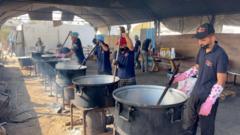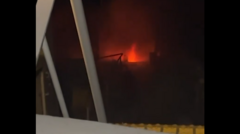With food supplies dwindling, Gaza's community kitchens are on the brink of collapse as the Israeli blockade continues to starve civilians.
Gaza's Emergency Food Relief Faces Critical Shortages Amid Ongoing Blockade

Gaza's Emergency Food Relief Faces Critical Shortages Amid Ongoing Blockade
Desperation Grows as Community Kitchens Struggle to Feed Gaza's Vulnerable Amid Blockade
In Khan Younis, the community kitchen run by American Near East Refugee Aid (Anera) dishes out urgent meals to approximately 6,000 hungry individuals daily despite the dire situation. Today, a simple lunch of koshari, made from lentils and rice, is being prepared for families lacking the means to buy food from the local markets. The head of Anera's operations, Sami Matar, revealed the shocking reality: "People rely on our meals; they have no incomes to buy what's left, and many essential foods aren’t even available."
The Israeli blockade, which has now lasted two months, has significantly hindered supply lines, cutting off critical food supplies, fuel, and medicine. The situation worsened after Israel ended a temporary ceasefire with Hamas, stating the blockade aims to pressure the group into releasing hostages. The UN's World Food Programme recently reported that it has run out of food aid, raising alarms about potential mass starvation.
The international community is mounting pressure on Israel to lift the blockade, emphasizing that starving civilians is a potential war crime. UN humanitarian chief Tom Fletcher condemned the blockade, urging that aid should never be used as leverage. “Blocking aid kills,” he stated, highlighting the dire implications of the blockade on civilian life.
Currently, hundreds of thousands of Palestinians are depending on a handful of community kitchens. However, Anera's stockpile, which was accumulated during the ceasefire, is nearly exhausted. "We expect we only have a two-week supply left—maybe even less," Matar lamented, showing a journalist the empty Anera warehouse. "We are struggling to provide food staples like rice and lentils; everything is so costly now."
Reports indicate that Israel has accused Hamas of diverting humanitarian aid for its own purposes, but humanitarian organizations deny such claims, asserting their strict monitoring processes to ensure aid reaches those in need. Matar detailed the transparency efforts in aid distribution that involve meticulous record-keeping to prevent duplications.
Recent accounts from those receiving aid paint a grim picture. One mother shared the frustrations of finding basic necessities while expressing gratitude for the warmth of the meal delivered to her family, unable to access cooking gas or additional food. “This is excellent,” she said, describing the pack of food she had just received, while recounting her struggles to find even a loaf of bread.
As conflict continues, the escalation has already resulted in tens of thousands of deaths, with a substantial proportion of the population displaced. The UN declares the current humanitarian crisis in Gaza as potentially the worst it has faced in years. Amidst this chaos, advocacy for humanitarian access is intensifying globally.
US President Donald Trump recently urged Israeli Prime Minister Netanyahu to permit more food and medical aid into Gaza, yet criticisms against the blockade persist from various international leaders. The Israeli Ministry of Foreign Affairs rebutted allegations of a humanitarian crisis by emphasizing its own aid deliveries to Gaza during the ceasefire.
As conditions worsen, vital aid supplies continue to pile up at Gaza's borders, while inside the territory, aid workers fear mere rationing may soon end. “I don’t know what will happen if our supplies run out,” Matar expressed his distress over the possible cessation of critical services to vulnerable populations. "We need to open the crossings again," he pleaded, underscoring an urgent call for immediate assistance.


















